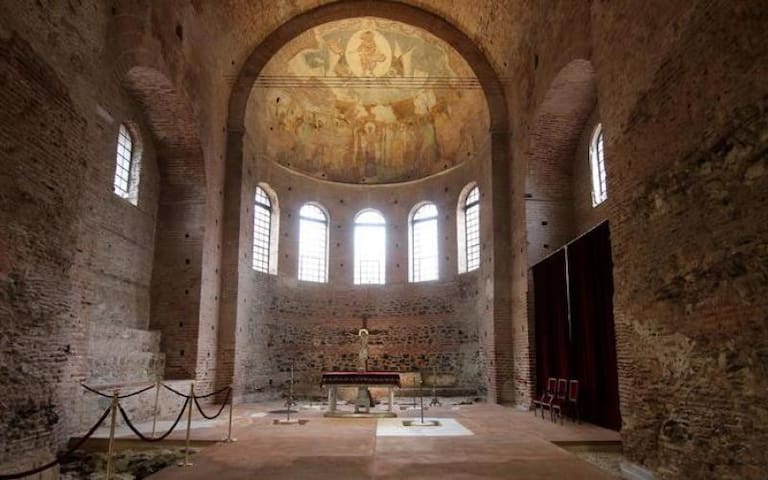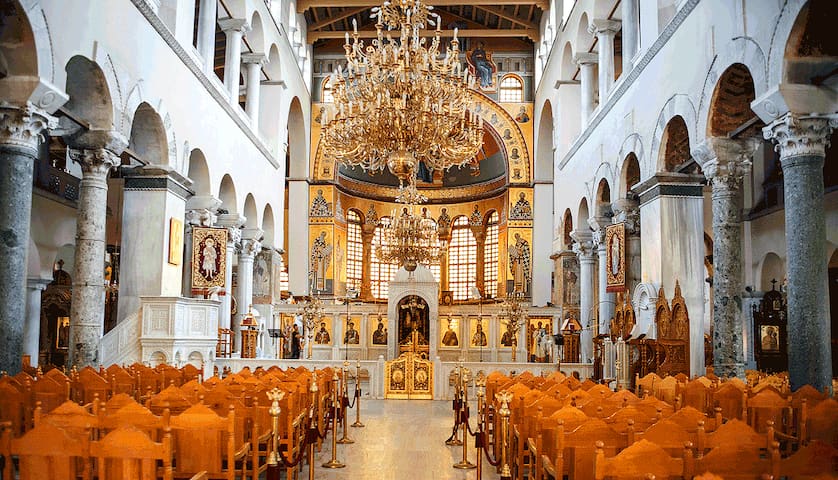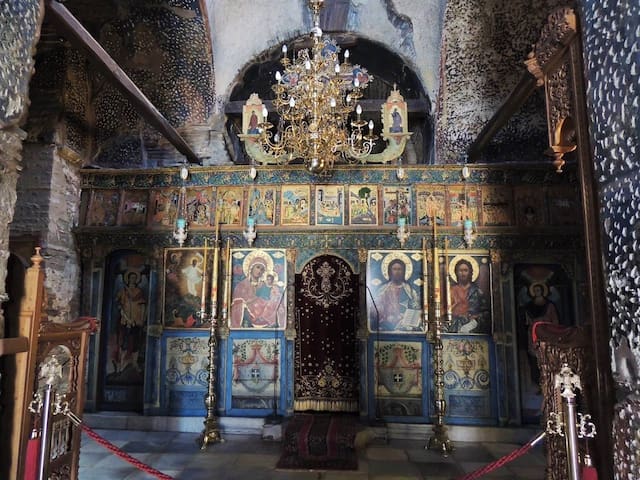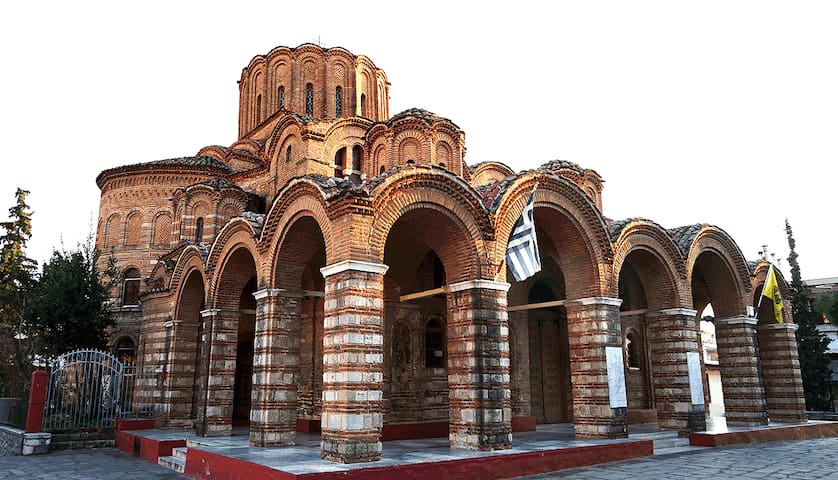History walks
Thessaloniki's historical landscape through UNESCO World Cultural Heritage Monuments. Η ιστορική φυσιογνωμία της Θεσσαλονίκης μέσα από τα Μνημεία Παγκόσμιας Πολιτιστικής Κληρονομιάς της UNESCO.
It is located in the eastern part of the historic center of Thessaloniki and is one of the most important Roman monuments in Greece. It belongs to the UNESCO World Heritage Sites.
The Rotunda as construction is unique in Greece because its circular shape refers to and follows exactly the style of the Pantheon in Rome. It has a height up to the dome of 29.80 m., Internal diameter 24.50 m. and its wall thickness is 6.30m.
The Rotunda mosaics even today are of exceptional beauty and technique, masterpieces both in terms of colors but for the vibrancy of their performance.
186 íbúar mæla með
Rotunda
5 Pl. Agiou Georgiou RotontaIt is located in the eastern part of the historic center of Thessaloniki and is one of the most important Roman monuments in Greece. It belongs to the UNESCO World Heritage Sites.
The Rotunda as construction is unique in Greece because its circular shape refers to and follows exactly the style of the Pantheon in Rome. It has a height up to the dome of 29.80 m., Internal diameter 24.50 m. and its wall thickness is 6.30m.
The Rotunda mosaics even today are of exceptional beauty and technique, masterpieces both in terms of colors but for the vibrancy of their performance.
The church of Agios Dimitrios, patron saint of Thessaloniki, is located in the center of the city, on Agios Dimitrios Street, above the ancient Agora and is undoubtedly its most important early Christian monument, both for religious and historical reasons.
165 íbúar mæla með
Kirkja St. Demetrios
Agiou DimitriouThe church of Agios Dimitrios, patron saint of Thessaloniki, is located in the center of the city, on Agios Dimitrios Street, above the ancient Agora and is undoubtedly its most important early Christian monument, both for religious and historical reasons.
Just one step from Tiepolo.
Agios Nikolaos Orfanos is one of the many precious treasures the old city hides. It stands like a small oasis that will take you centuries back within seconds in a magical way. You’ll immediately understand from the very first moment that there is something different about that building. The temple was built at the beginning of the 14th century during the Paleologian period of the Byzantine Empire in 1320 aD. It is the “Katholikon” (main temple) of an older Byzantine monastery while it still remains a glebe of Vlatadon Monastery and belongs to the Ecumenical Patriarchate of Constantinople.
14 íbúar mæla með
Church of Agios Nikolaos Orphanos
IrodotouJust one step from Tiepolo.
Agios Nikolaos Orfanos is one of the many precious treasures the old city hides. It stands like a small oasis that will take you centuries back within seconds in a magical way. You’ll immediately understand from the very first moment that there is something different about that building. The temple was built at the beginning of the 14th century during the Paleologian period of the Byzantine Empire in 1320 aD. It is the “Katholikon” (main temple) of an older Byzantine monastery while it still remains a glebe of Vlatadon Monastery and belongs to the Ecumenical Patriarchate of Constantinople.
Hagia Sophia in the city center is one of the most important early Christian Byzantine churches in Thessaloniki with ornate and rare mosaics!
117 íbúar mæla með
Hagia Sophia í Thessaloniki
Agias SofiasHagia Sophia in the city center is one of the most important early Christian Byzantine churches in Thessaloniki with ornate and rare mosaics!
It is located near the walls of the Acropolis, in Ano Poli. Its location offers a wonderful panoramic view of the city.
the monastery was known as “Cavus Monastir”, a name that was probably related to the head of the Turkish garrison.
The frescoes date from the years 1360 to 1380. The dome depicts the Pantocrator while in other parts of the temple there are frescoes with scenes of the Dodecahedron, figures of ascetics, monks and military saints, the Baptism and in part the miracles of Jesus.
The wood-carved iconostasis probably dates back to the 17th century. Unique relics are kept in the sacristy of the Monastery. Among them, are sacred utensils, manuscripts and icons dating from the 12th to the 19th century.
48 íbúar mæla með
Vlatadon klaustur
64 EptapirgiouIt is located near the walls of the Acropolis, in Ano Poli. Its location offers a wonderful panoramic view of the city.
the monastery was known as “Cavus Monastir”, a name that was probably related to the head of the Turkish garrison.
The frescoes date from the years 1360 to 1380. The dome depicts the Pantocrator while in other parts of the temple there are frescoes with scenes of the Dodecahedron, figures of ascetics, monks and military saints, the Baptism and in part the miracles of Jesus.
The wood-carved iconostasis probably dates back to the 17th century. Unique relics are kept in the sacristy of the Monastery. Among them, are sacred utensils, manuscripts and icons dating from the 12th to the 19th century.
Built in the 5th century as the Catholicos of the Monastery of the Savior Christ of Latomos, this holy temple is located in the Upper Town of Thessaloniki, near the Monastery of Vlatada. The monastery of Latomou is characterized as one of the most important monuments, due to the unique early Christian mosaic decoration and the Byzantine frescoes that adorn the church.
19 íbúar mæla með
Ιερός Ναός Οσίου Δαβίδ
17 EpimenidouBuilt in the 5th century as the Catholicos of the Monastery of the Savior Christ of Latomos, this holy temple is located in the Upper Town of Thessaloniki, near the Monastery of Vlatada. The monastery of Latomou is characterized as one of the most important monuments, due to the unique early Christian mosaic decoration and the Byzantine frescoes that adorn the church.
Built on a natural hill, it once dominated Thessaloniki. Built in the 14th century, it is unique in the city for its type: four-column cruciform inscribed with side dances. Its mural decoration is representative of the last phase of palaeological painting.
10 íbúar mæla með
Prophet Elias Church
91 Προφήτη ΗλίαBuilt on a natural hill, it once dominated Thessaloniki. Built in the 14th century, it is unique in the city for its type: four-column cruciform inscribed with side dances. Its mural decoration is representative of the last phase of palaeological painting.




